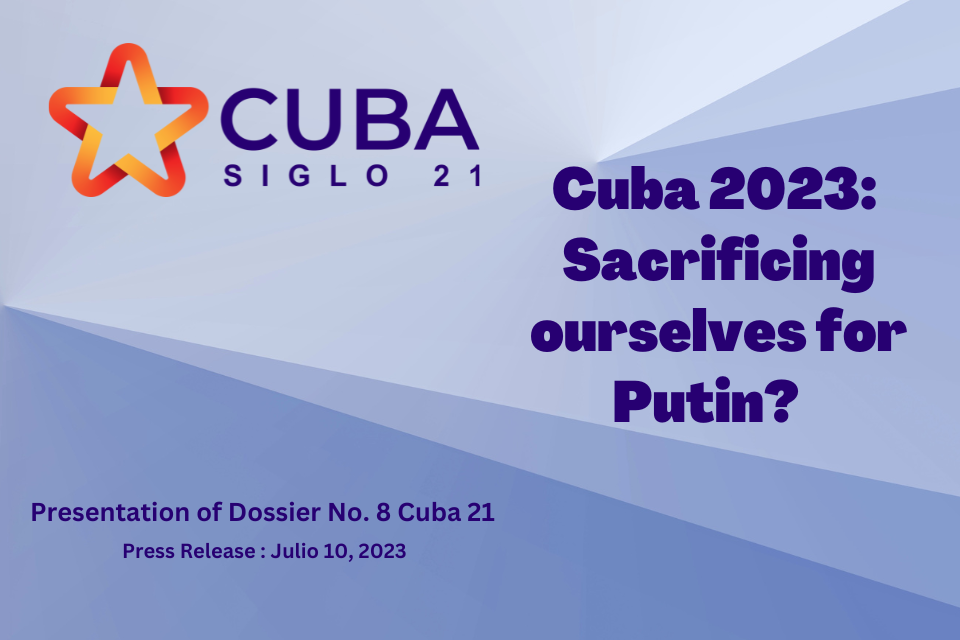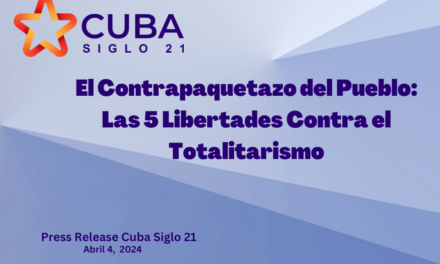Download entire Dossier No. 8 English
Descargar Dossier No. 8 Español completo
See Summary Dossier No. 8 English
Transcription English Conversation of General Raúl Castro with Yu. V. Andropov
(June 10, 2023) In the conversation between Andropov and Raúl Castro, on December 29, 1982, which today is appended to Dossier Cuba 21 No. 8 “Cuba 2023: Sacrifice us for Putin?”, the then leader of the USSR clearly stated that his country – the second world superpower at that time – would not get involved in the military defense of Cuba.
“We cannot fight in Cuba. Simply because you are 12,000 kilometers away from us […] To go there to get our faces smashed in? No!”, Yuri Andropov replied to Raúl Castro’s request that the USSR make public its unconditional support for Cuba in case of US aggression.
Analysis of that exchange between Andropov and Castro four decades ago also makes it possible to identify the probable real objectives behind actions such as the visit of the Baltic Fleet warship to Cuba and the growing calls to Putin by Kremlin-friendly media, institutions and “experts” to establish a significant military presence on the island.
General Rafael del Pino, author of the Dossier, demonstrates the numerous occasions in which first the USSR and then Russia have involved Cuba in high-risk activities convenient to their strategic interests, only to later unilaterally take the decision to leave the island’s security unprotected. At the center of his research is always the question of whether Cubans will once again run risks and pay sacrifices for such an unreliable ally, regardless of the repugnant nature of its current intentions.
Del Pino also examines various historical situations in which Washington has succeeded in dispelling threats from Cuba, Russia, and Syria by combining secret diplomacy with various punitive actions, including military ones, in a balanced manner.
There is a quantitative and a qualitative difference that Moscow intends to achieve on this occasion, with Khrushchev’s operation in 1962, which aimed to abruptly achieve nuclear parity with the US by acquiring the capacity to deliver a devastating first strike.
The idea of stabilizing a flow of visits by Russian nuclear-armed vessels is to enable Putin to engage in a credible nuclear blackmail. Putin, who has theatrically managed his role as an irrational actor to threaten Europe with the use of nuclear weapons if NATO does not cease its support for Ukraine, would now try to bring that and other demands to the U.S. by sitting on its doorstep as a sort of Bin Laden wearing a nuclear explosives suicide vest. That would not require the massive resource mobilization of 1962 but the continued presence in Cuba of at least one ship capable of launching a limited nuclear strike, but one that would cause intolerable damage.
The production of strategic intelligence distinguishes between the possible and the probable. A scenario like the one analyzed here is possible and in Moscow there is already a chorus of voices demanding its materialization. Cuba Siglo 21 considers that the probability of its materialization grows in direct proportion to Putin’s military defeats in Ukraine. Quantum Physics established that the observer may alter what is observing only by engaging in this exercise. In political science, identifying a possibility and discussing it can alter the probabilities for its eventual materialization. If only for that reason, we are pleased to address the highly important topic presented in this Dossier.
Cuba Siglo 21 supports the analysis made by General Rafael del Pino.
Download entire Dossier No. 8 English
Descargar Dossier No. 8 Español completo
See Summary Dossier No. 8 English
Transcription English Conversation of General Raúl Castro with Yu. V. Andropov







